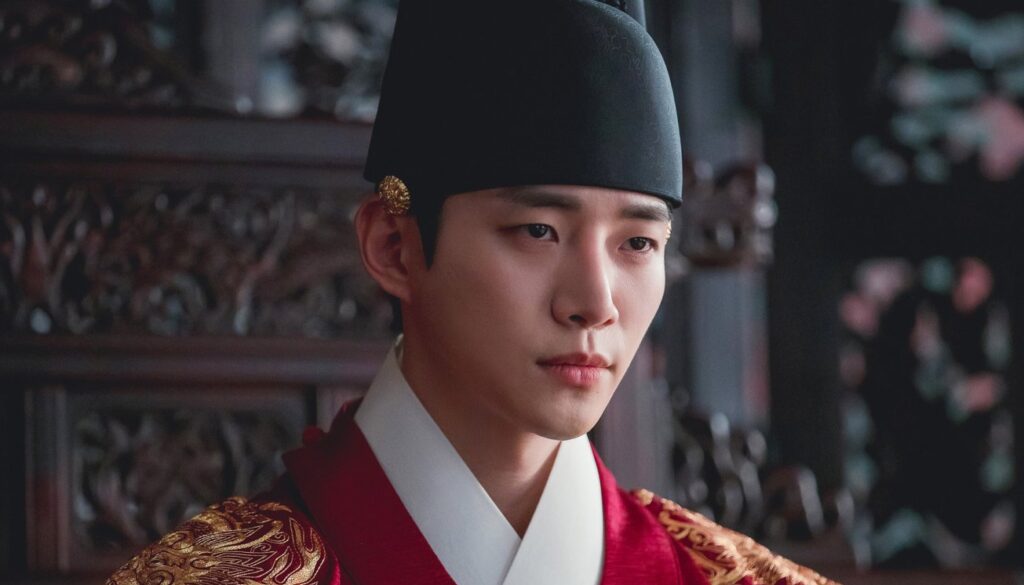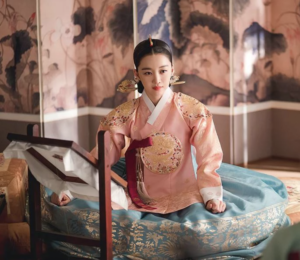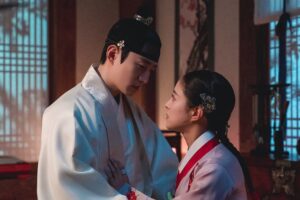
MBC’s latest sageuk offering, The Red Sleeve, ended on a high of 17.4% in viewership ratings, one of MBC’s best-rated dramas since 2015. The drama also swept MBC’s Drama Awards in 2021, taking home ‘Best Drama’, ‘Best Script’, and top excellence awards for both leads and others. Its hype is well-deserved, given that this drama consistently delivered week after week, blessing viewers with its thought-provoking script, beautiful cinematography and top-tier acting by the whole cast. In particular, Junho and Lee Se-young perfectly embodied their titular roles and made this whole viewing experience extremely immersive.
This review contains spoilers.
The second half of the drama, like its first half, continued its focus on court ladies, giving a valuable yet oft-neglected voice to the many women who spend their entire lives in the palace. Many perspectives were provided, beginning from court ladies who have to live lives of abstinence because they are women of the King, even though most do not even come near him in their lifetimes. Deok-im’s friends, Bok-yeon (Lee Min-ji), Kyung-hee (Ha Yul-ri) and Young-hee (Lee Eun-saem) represent this group, and through their individual arcs, the drama heart-breakingly highlights how lightly-regarded their lives were in that era.
As a court lady at the King’s Court, Bok-yeon had to be sent out of the palace the moment King Yeong-jo (the marvellous Lee Deok-hwa) passed away, and was forced to work at her relative’s soup restaurant – a far cry from her relatively comfortable days at the palace. When Kyung-hee and several other court ladies were kidnapped by a crazed Hong Deok-ro (Kang Hoon), who was Yi San’s right-hand man at the time, Deok-im was forced to confront the terribly real possibility that the lives of a few court ladies could easily be sacrificed to keep Hong in power, as long as that was what the king wanted. It made her lose trust in Yi San, but this plot point highlighted how these lives were just regarded as pawns in the bigger picture of things.

The lack of autonomy faced by court ladies extended to Queen (and later Queen Dowager) Jeongsun (Jang Hee-jin). She entered this glided cage of a palace at 15, married to the old King Yeong-jo, and lived an ironic life filled with both power and powerlessness. As Queen Dowager, she was the only one who was able to stand up to the King, and she had full control over the internal court. As a wife of the King, however, she could not take a single step out of the palace, not even to attend her brother’s funeral when he was in exile.
Bound by tradition and expectations, the increasing despair and loneliness that she felt as she continued to spend her years in the palace were palpable, and it didn’t help that her complex political position made it difficult for her to have true friends. Queen Jeongsun adored Deok-im’s wit and personality throughout her life, but Deok-im was never able to let her guard down around the Queen, for fear that she would be turned into a pawn to be used against the King. It was certainly true that Queen Jeongsun planned to use Deok-im in that way, but underneath those scheming layers, there was certainly a genuine desire for a companion, someone who she could rely on and tide through this loneliness with.
The loneliness of the palace was best embodied by the short and tragic life of Hong Dan (later Royal Noble Consort Wonbin Hong). When she was first introduced as Hong Deok-ro’s young sister, she was a bright and excitable child – she loved the views of the palace when she visited and developed an adorable relationship with Deok-im, who she looked up to. She eventually entered the palace as Yi San’s concubine, thanks to the political ambitions of her brother. Unfortunately, her joy quickly diminished, and the many long days she spent waiting in her palace for Yi San to come when she should have been playing outside with her friends like other girls her age took a huge toll on her emotional health, and she eventually passed away due to depression and sickness. This arc played out as expected, given that the real-life Wonbin passed away very quickly after she entered the palace, but it was still very difficult to watch how so much life seeped out once she entered the palace. Park Seo-kyung pulled this off very well in the brief time she was on screen.
Having spent almost the entirety of her life in the palace, Deok-im watched all of these tragedies go on, and perhaps it added to her resolve to lead a life with as much autonomy as possible, since there was already so little freedom that she had. Her struggle was a complex one, especially when it started to be at odds with her growing love for Yi San. To be with the man that she loved, she would have to give up even the limited independence that she had, and even then, she would not be able to have him to herself. As such, she chose for a long time to reject him, going so far as to hurt him with her words and actions so that he would give up on her.
For K-drama viewers who are used to romantic fairytale endings, this drawn out conflict added a bit of frustration to the watch, since viewers could tell that they both obviously loved each other, but kept hurting each other in extremely toxic ways. I will admit, I definitely did think ‘Why couldn’t she just give in to her feelings and say yes? They would be so happy together!’ at some points in my watch.
When she finally accepted him and became a concubine in the drama’s penultimate episode however, it was a much more bittersweet resolution than I expected. Yes, she got to wear gorgeous clothes and live in the beautiful annex that they spent their most intimate moments in. Yes, they got to express their love freely to each other. Yes, Yi San was finally happy and satisfied. But at what cost? Deok-im was no longer able to go out of the palace, hang out with her friends as freely as she used to, she could not do her transcribing work for fear that it would disgrace the king, and now she had to spend her days waiting for a king who may or may not come.

The last straw came when Deok-im became pregnant and Yi San had to go spend the night with his barren queen instead (to comfort her), even though he was extremely delighted at the news. He too, was constrained by his role as the king, and the responsibilities he had towards his people. As such, he often could not act as his heart desired, and Deok-im was well aware of that, but this knowledge did nothing to alleviate the pain she felt of having to share her husband with others.
In a manner similar to Hong Dan’s life, Deok-im lost a lot of life the moment she stepped into the role of a concubine, and you could just see something change within her the moment she consented to spending the night with Yi San. She was letting go of her limited autonomy, something she had worked so hard to protect all these years, and it was painful to see her bear the weight of that cost. As a viewer, this was the moment that I fully understood why she bothered struggling for that long. That was how precious that autonomy was to her, and its importance was only truly visible after it was stripped away. What a tragedy indeed.
The Red Sleeve stayed faithful to the novel it was based on, and to history, all the way till its devastating end. Yi San, who was steadfast in caring for his people and striving to be the best king he could ever be, but who had also craved close companionship all his life, ended up losing everyone who he held close – whether it was Hong Deok-ro who he had grown up with, or Deok-im, the only woman he ever loved in his life. It is terribly unfortunate that his dreams of having a family with her were so short-lived, but it was great that the drama did not choose to distort this part of history. What makes this conclusion, and the story as a whole so impactful is that these are things that the real life Yi San and Deok-im went through. The drama is definitely its best in making this part of history come alive to viewers, while honouring the love that Yi San and Deok-im shared, through death and beyond.
A lot of things happened in this jam-packed 17 episode long sageuk, many of which I did not cover here, but The Red Sleeve‘s dedication in helping viewers understand how life for court ladies would have been in the past is extremely admirable. The acting was fantastic all around, and the extreme efforts that the entire cast and crew put into to the creation of this drama really showed in its quality.
No plot point was meaningless, no shot was unintentional, and the many time skips in the last few episodes were executed smoothly. The music composer for this drama, Noh Hyung-woo also deserves huge applause for the poignantly beautiful OSTs that played a big part in making The Red Sleeve the emotive journey that it was. Lee Sun-hee‘s final OST “I’ll Leave You” is a masterpiece that perfectly captured the tragedy of this drama, and is a song that will stay with me for a long, long time, just like the drama it accompanies.
(YouTube. Images via MBC Drama.)


